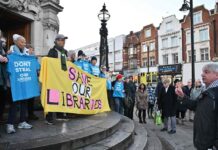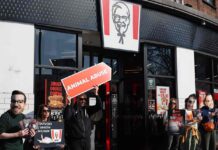Alice Crawford recently arrived home to Brixton after serving as an ecumenical accompanier with the Ecumenical Accompaniment Programme In Palestine And Israel, working in an international team in East Jerusalem
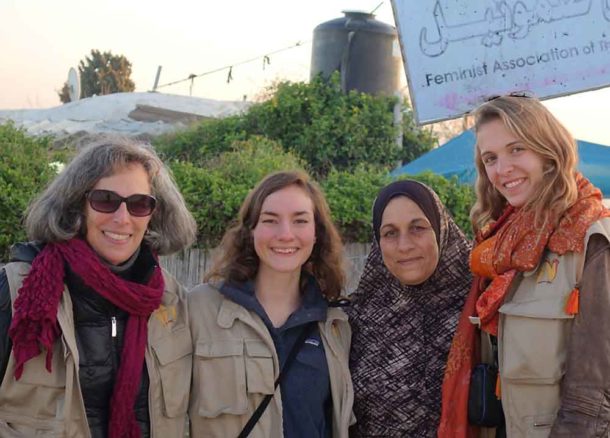
I served for three months as an Ecumenical Accompanier with EAPPI (the Ecumenical Accompaniment Programme in Palestine and Israel).
Though no two days were the same, my typical week would include monitoring and reporting on breaches of international humanitarian law, for example, the treatment of Palestinians passing through the Israeli military checkpoint of Qalandiaya on their way to work every day or the demolition of Palestinian homes; walking children to school past soldiers and checkpoints; and supporting Israeli human rights and peace activists at their weekly vigils to demonstrate against the military occupation of the West Bank.
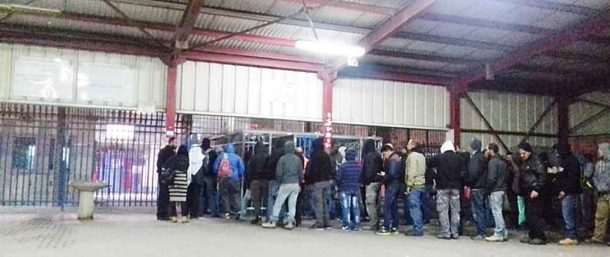
For the last 50 years the West Bank has been under Israeli military occupation.
The occupation is recognised as illegal under international law and condemned by the international community. Under the Oslo peace agreement, signed by Israel and the Palestinian Liberation Organisation in 1995, an area constituting 60% of the West Bank was meant to come under Palestinian self rule within five years. Over 20 years on, the reality could not be more different.
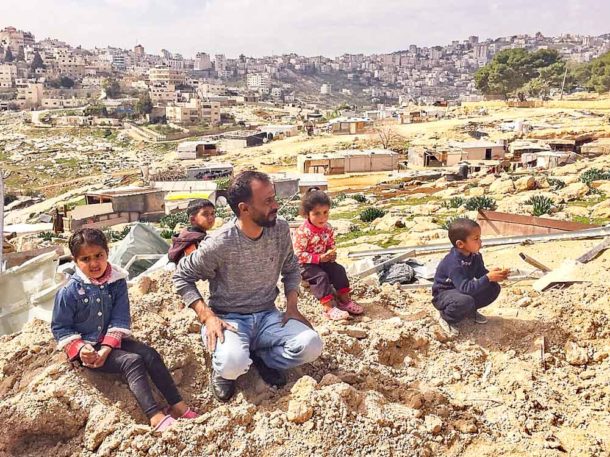
I visited the Palestinian Bedouin community of Jabal Al Baba (Pope Mountain) every week.
Like almost all the Bedouin communities in the West Bank, the village has been given a full demolition order by the Israeli government and, though it is built on land owned by Palestinians and the Vatican, the residents are at risk of losing their homes at any time.
The residents of Jabal Al Baba are refugees, their families having been displaced from the Negev, now southern Israel, when the state of Israel was established in 1948.
Now they are at risk of displacement again. One man told me: “Nothing can replace our houses. This land is where we were born and we want to die here.”
In February this year a house in Jabal Al Baba was demolished by the Israeli authorities, making a family of 13 homeless.
The reason the Israeli government gave for the demolition was that the family did not have an Israeli permit to build the house. But, for Palestinians, these are almost impossible to get.
In November last year, the school at Abu Nuwar, another community we worked with, was demolished for the fifth time by the Israeli authorities.
The school was funded by the European Union and the EU, including Britain, condemned the demolition.
Abu Imad, the community’s leader told us: “We will build again … continuing the children’s education is the most important thing”.
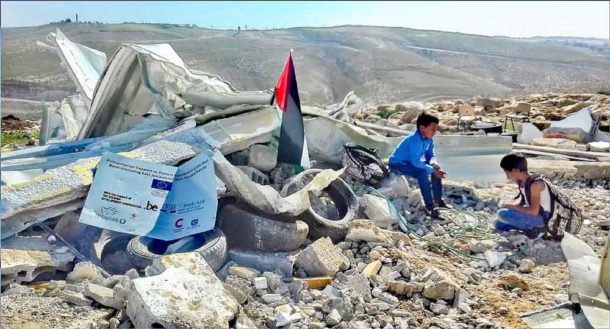
November 2017: Children play in the rubble of Abu Nuwar school
The forced displacement of Palestinians – the confiscation of their land and destruction of their property – and the settlement of Israelis in the West Bank are examples of the many ways in which the occupation breaches international law.
According to B’Tselem, The Israeli Information Center for Human Rights in the Occupied Territories, there are more than 600,000 Israeli settlers living illegally in the West Bank, while Palestinians are stopped from building on over 70% of the land.
As an ecumenical accompanier I worked closely with Israelis who were supporting Palestinians’ rights and working to end the occupation.
Combatants for Peace is an NGO in which Israeli ex-soldiers and Palestinians who have been involved in armed resistance to the occupation work together.
One of their activities is rebuilding houses which have been demolished by the Israeli authorities in villages like Jabal Al Baba.
Combatants for Peace believe that “the cycle of violence can only be broken when Israelis and Palestinians join forces” and work to “both transform and resolve the conflict by ending Israeli occupation and all forms of violence between the two sides … building a peaceful future for both peoples”.
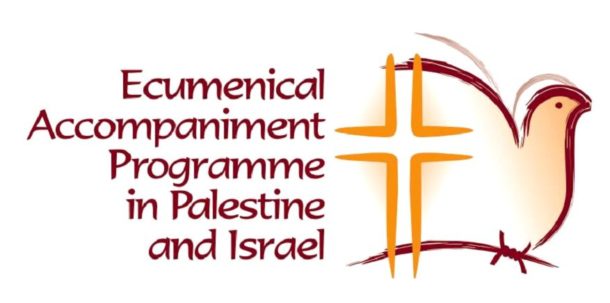
The majority of Israelis are conscripted into the military at 17. Through another Israeli NGO, Breaking the Silence, ex-soldiers tell their stories, revealing both the reality of life for Palestinians in the occupied territories and the reality for Israeli soldiers who “witness and participate in military actions which change them immensely”.
Such NGOs work to avoid further trauma and loss of life on both sides of the conflict, but their members are an unpopular minority.
Peaceful protesters at the Women In Black vigil in Jerusalem which calls for an end to the occupation of the West Bank hold signs saying “end the occupation” in Hebrew, English and Arabic. They are verbally abused by some of their fellow Israeli passersby who tell them they are “traitors”. One woman who goes every week told me “we need your support to know we are not alone”.
As a Brixton resident I am more grateful than ever that I don’t live in fear – that I can walk down Brixton Road and see people from all over the world and feel that we can be a community, that we don’t have a to pick any “side”.
My admiration for Palestinians and Israelis who take a stand against picking a side and dehumanising the “other” – who work to build reconciliation in the midst of a conflict in which new scars are being created all the time – only grows as I reflect on my time in Israel and Palestine and the privileges I experience at home.
What you can do
- Read the first-hand accounts of ecumenical accompaniers from the field and take the suggested actions; or
- Ask one of us to come and speak at an event
- Support the community of Jabal Al Baba to stay on their land
- Write to your MP to express concern about the demolition of a British-funded school in Abu Nuwar (you can read the EU statement here)
- Support local NGOs such as Combatants for Peace and Breaking the Silence
- Consider becoming an ecumenical accompanier yourself or donate to EAPPI.



